Support for Osaka Prefecture's Carbon-Neutral Technology Development and Implementation Project

Partnership of Industry and Academia with the University of Tokyo
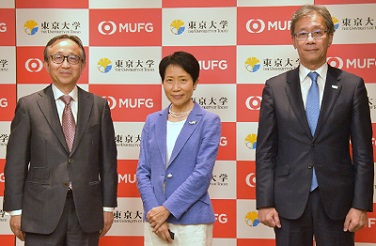
Support for Hydrogen Fueled Bus
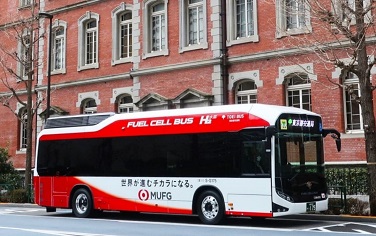
Various initiatives are currently underway to realize a hydrogen energy-based society in Japan. Among them, the introduction of fuel cell buses (hydrogen buses) as commercial vehicles is attracting attention because it is expected to create stable hydrogen demand while contributing to decarbonization.
Against this backdrop, MUFG made donations to the Tokyo Metropolitan Bureau of Transportation, Osaka City Bus, and Nankai Bus to support their promotion and introduction of fuel cell buses (hydrogen buses). In FY 2022, we provided support for the introduction of hydrogen buses in Nagoya City.
MUFG Forest for Working Together with Customers
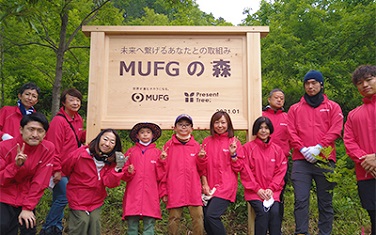
MUFG is undertaking the MUFG Forest Project, which involves planting about 100,000 trees and donating a total of 500 million yen over 10 years to fund their cultivation. 100,000 trees absorb CO2 that is equivalent to the annual CO2 emissions from the electricity use for the cooling of 10,000 households.MUFG plants trees through the Present Tree (note1) project in line with the number of bankbooks, documents, and usage statements issued by its group companies that have been switched from paper to online, as well as the number of new applications for online services. By January 2023, 55,581 trees have been planted.
(note 1) The Present Tree project was started by Environmental Relations in January 2005. Through this project, participants plant trees for loved ones or themselves to help reforest and revitalize local communities. MUFG is planting trees in places where forests should be created, such as forests damaged in natural disasters, former development sites, and abandoned clear-cutting sites in various parts of Japan, where the birthrate is declining, and the population is aging.
Support for Cyclic Utilization of Forests
In recent years, the abandonment of artificial forests planted for timber production has become a serious social issue. In light of this, MUFG made donations (60 million yen in total) to the Lifestyle Research Institute of Forests, which is engaged in forest conservation activities as part of our efforts to promote the cyclic utilization of forest resources. This is a process in which trees are planted, grown, harvested, used, and planted again. Approximately 2,400 employees participated in volunteer activities to create educational puzzles using thinned wood. The finished puzzles were donated to kindergartens and other children's facilities.
MUFG, in collaboration with the organization, has also started planting forests in Nose, Osaka, planting sawtooth oak trees and trees of chestnuts. Oak tree are used as materials for sawtooth oak charcoal, a traditional industry in the region and trees of chestnuts are a specialty product there.
To leave bountiful forests for the next generation, we will continue to support forest conservation activities, including tree planting, thinning, and the use of thinned wood.
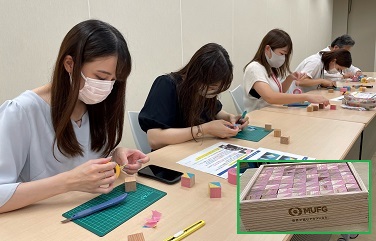
Employees making puzzles from thinned wood
Beach Cleanup
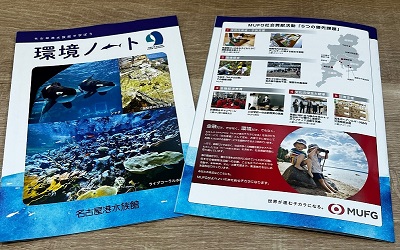
Pollution of oceans and coasts is becoming more serious, and the problem of plastic in the ocean has gained worldwide attention.
In FY 2022, MUFG hosted the Beach Cleanup Event as an activity for protecting oceanic resources in Kanagawa, Aichi, and Hyogo Prefectures. Approximately 400 participants, consisting of MUFG employees and their families, participated in coastal cleanup activities together with local environmental protection organizations. There was wide participation in ocean education events and this was a great opportunity to think about the problem of garbage in the oceans.
In Aichi, we provided financial support for the creation of “Environmental Notes”, which are published by the Port of Nagoya Public Aquarium to allow visitors to learn about what species live in the ocean and how they live. The completed notes are distributed to students who visit the aquarium as a way for them to have the opportunity to learn about ocean conservation activities.

